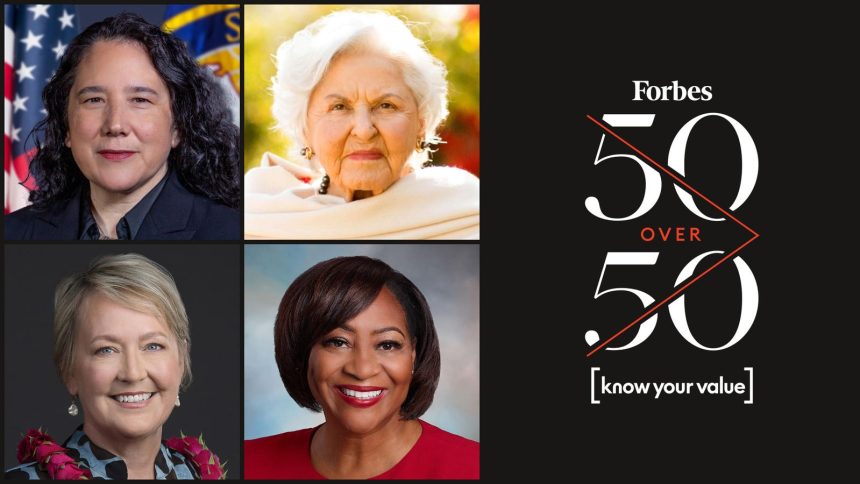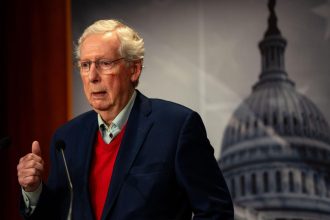In 1974, President Gerald Ford signed the Equal Credit Opportunity Act into law, making it illegal for lenders to require that women have a male cosigner when applying for credit cards, mortgages or bank accounts. This landmark legislation happened within the lifetimes of the 2024 50 Over 50 listees, and so we asked them to share what this anniversary means to them.
By Vickie Chachere, Forbes Staff
If progress towards full gender equality in society feels slow (and the U.N. has said it will take another century to hit that mark), consider this: Every single one of the 200 people on the 2024 50 Over 50 list was born into a society in which American women could not apply for a credit card, mortgage or bank account without a male cosigner. This changed in 1974, when President Gerald Ford signed into law the Equal Credit Opportunity Act, which outlawed lenders requiring a husband’s, father’s or brother’s signature for a woman applying for credit.
Until the passage of the law—which was introduced by legendary New York congresswoman Bella Abzug—banks and creditors also could cancel a credit card if a woman went from being married to divorced. They could, and did, ask wives about their use of birth control, often requiring so-called “baby letters” from women’s doctors to certify that a woman seeking a loan was using contraception. Records from public hearings and legislative procedings in the 1960s and early ‘70s show that women were even, sometimes, asked if they intended to have children if a couple included a woman’s income on their joint loan application.
The economic implications of the ECOA have been far reaching. It also prohibited discrimination on the basis of race, color, religion, national origin, sex, or marital status in credit transactions. But progress since the landmark legislation was passed also is incomplete: Women are more likely to be rejected for a business loan than men, even though women who run their own businesses generate more revenue than men do (10% more over the course of five years, according to a Boston Consulting Group analysis).
We asked this year’s 50 Over 50 listees to share their reflections on the 50th anniversary of the Equal Credit Act. Some had vivid recollections of their mothers’ and grandmothers’ relationships with credit—and the way credit access allowed for better autonomy and helped some to live with dignity after divorce or widowhood. Others had their own distinct memories of their first credit card, a signifier not only of credit worthiness but also a rite of passage and important first step towards financial freedom.
Here’s a bit of what they shared:
Deborah Szekely
102 | Founder, Rancho La Puerta & Golden Door
“I remember many years ago going to my then-ex-husband and asking him to co-sign my application for a credit card, and I think it’s wonderful to see the progress that has been made and continues to be made.”
Anne Fulenwider
52 | Co-founder & CEO, Alloy
“I remember grocery shopping with my mother in elementary school and seeing her name on her American Express card listed as “Mrs. Michael Fulenwider” and thinking, ‘Ugh, my mom is so old-fashioned, why can’t she just go by Constance Fulenwider?’ I never asked her about why she didn’t have her own name on her card, and it wasn’t until years later that I realized this was because she was prohibited from doing so. … I am so proud of my financial independence and grateful to the women who came before me who fought for women’s rights, managed their professional and personal lives, allowing me and inspiring me to forge this path.”
La June Montgomery Tabron
61 | President & CEO, W. K. Kellogg Foundation
“Receiving my first credit card helped me understand later why pursuing rights for disadvantaged people and women is so critical. Credit cards can provide food security and a credit history and open the door to other opportunities not readily available to people who lack equitable access.”
Alina Villasante
63 | Founder, Peace Love World
“With my first credit card I had freedom to make my own decisions and had the responsibility of building my own credit. I actually think it was the first step to entrepreneurship.”
Isabel Casillas Guzman
54 | Administrator, U.S. Small Business Administration
“A credit card is often the only available source of capital for startups. This anniversary is somewhat bittersweet as it reminds me of the many women who have had to leverage credit cards to build their American dreams of business ownership. In fact, women had to wait more than a decade for the Women’s Business Ownership Act of 1988, which finally cleared the pathway for women to also get loans without having a male family member co-sign. Today, women still face barriers accessing loans and investment capital for their businesses, with 30% of small businesses using credit cards for financing. This anniversary is my inspiration that there is more work to do at the SBA to provide women with the affordable, competitive funding they need so they can reach their full potential and impact on our economy.”
Laurie Adams
54 | President & CEO, Women for Women International
“It is appalling that within my lifetime women in the U.S. still needed male cosigners. But what is even more appalling is that in the vast majority of countries WfWI (Women for Women International) works in, male permission is still necessary on not just bank accounts (credit cards are simply not available to most women we serve) but also to go out to work, to own land, to get married, to go to school — and this is what we are working to end.”
Beezer Clarkson
52 | Cofounder & Partner, Sapphire Partners
“The ability to independently manage finances meant empowering women to control their purchasing decisions — a huge step forward in gender equality, but also a battle that took far too long to win, and frankly one we never should have had to fight. Today, only 8-9% of LPs (limited partners) in the venture ecosystem are women; a tiny sliver of the pie, but a remarkable upgrade from when I began my career. This anniversary is not just a reflection on past achievements but a call to action to continue striving for greater representation and influence in venture.”
Lisa Paulson
59 | Executive Director, MauiHotel and Lodging Association
“I distinctly remember my mother getting her own credit card for a department store. She said it was about *** time women had financial independence! I remember my first credit card and the ability to rent a car and travel without taking wads of cash.”
Avantika Daing
52 | Founding Partner, Plum Alley
“When I first came to the United States, I didn’t have much. I went to the only tiny bank in Wooster, Ohio – a community union bank. I worked three jobs, and the bank manager was amused by my tenacity. He recommended that I get a credit card right away, but because I came from India, where the stigma attached to credit cards was negative as they were considered loans or for those who could live within their means, I opted for a debit card instead…. [The eventual decision to open a credit card] marked a significant step in my financial journey, symbolizing not just my adaptation to a new culture but also my growing confidence in managing my finances independently. And, understanding the power of credit and leverage.”
Sandy Carter
61 | Chief Operating Officer, Unstoppable Domains; Founder, Women of Web3
“My grandmother was a spitfire, and even at barely 4′ 11″, she played basketball in high school! I vividly remember the stories she shared about the challenges she faced before the legislation allowing women to open a credit card in their own name was passed. She often recounted how she had to rely on my grandfather for financial transactions, even though she was the one managing the household finances. When she finally received her first credit card in her own name, it was a moment of empowerment and pride. It signified her independence and ability to control her own financial destiny, a right that had been unjustly denied to women for too long.”
MORE FROM FORBES
Read the full article here














